“I must go down to the seas again, to the lonely sea and the sky,” John Masefield wrote, for unknown reasons. I knew why I was going to the seas, though. My dear bride had discovered that there was a special Olivier Award-themed Cunard cruise.
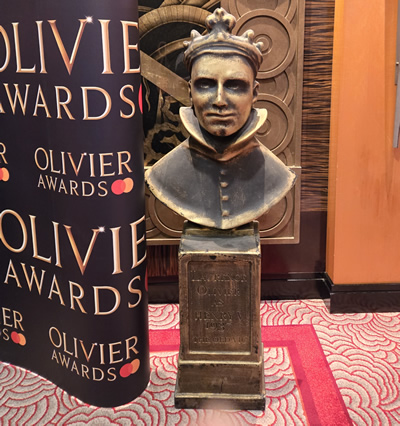
And in one stroke my travel plans for the summer were all decided.
The Sailing
I may have told you this already, but Lorraine is a huge theater buff. I confirmed this one day when I saw her in rapt attendance on a broadcast of a Greek play from the Acropolis – in Greek, a language neither of us understood. The Olivier Award are the British equivalent to the Tony. It is named after Sir Laurence Olivier, and the award is modeled on his face, as he appeared in a 1938 production of Henry V. I do not know whether Olivier ever won an Oliver award.
This voyage – from Brooklyn to Southampton – would be on the Queen Mary 2. I’m told that there are two bigger ships in the world, each of which may have its own field of gravity. But Mary 2 was big enough, believe me.
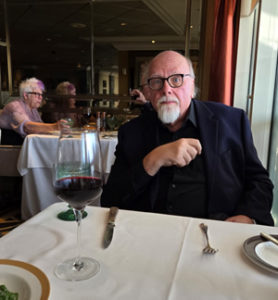
The QM2 is a Cunard ship. Cunard is an old and venerated shipping line, noted for its spacious accommodations and good food.
They have a thing about clothes, though. In the evenings they want you to wear “smart attire” which I found out (after a lengthy cross-examination) means business casual. Certain nights are formal nights (you can rent a tuxedo from them). On one of these I forgot to wear a coat, so the waiter draped one over my chair, which made me think that my chair was underdressed. The rest of the time you can wear stupid attire.
The voyage was surprisingly affordable – about $2500 for the two of us. This covered a journey of eight days and seven nights, including meals. We got a “covered balcony” which means a bedroom the size of a medium hotel room, with a box cut out of the ship’s superstructure outside. The box had an open porthole, and it was pleasant to sit there and read, breathing in the sea air and gazing out the porthole. (Spoiler alert: outside the porthole was the Atlantic Ocean, for all eight days). Even though it was late June, the temperature outside was in the low sixties, which meant that our room had the uncovered balcony beat to all heck.
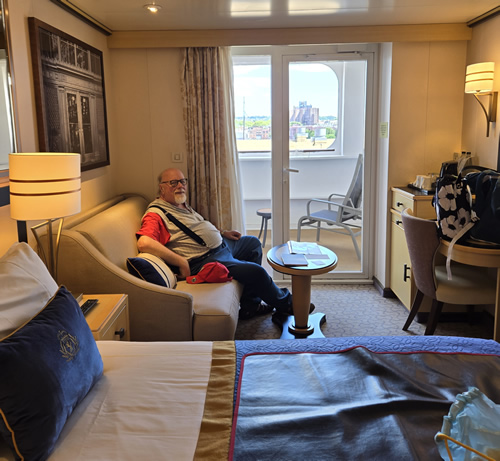
There were fancy breakfasts, a few enjoyed in our suite, and five-course dinners. I’m sure lunch was similarly swell but we were too busy to eat it. We’d eat dinner with other passengers, many of whom were full of surprises. One built a log cabin in his spare time. Another became an expert on Enigma machines after a career in neurobiology and was on his way to lecture about the Word War II de-coding apparatus in its inventing country, Germany. A third was a State Senator from Oregon (R).
There were a dozen legitimate West End stars on the ship, and they lectured, entertained, and gave classes. You could get educated in song or in dance; if you so elected, you would be part of a performance the West Enders staged on the last day of the cruise. I attended an acting class given by a tyro director, but was not asked to perform.
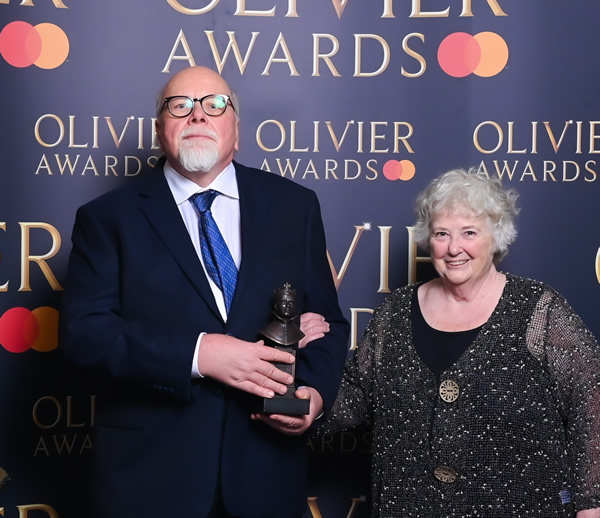
One of the features of the trip was that they would let us hold an Olivier for 4 seconds for this photo. Looks natural, doesn’t it?
We landed in Southampton on a Sunday, and a bus took us to London, where we eventually ended up at The Grand at Trafalgar Square, a hotel recommended to us by a friend who frequently goes to London for the theater. Lorraine was feeling under the weather, so I undertook a bus tour of London on my own. It was a double-decker, and seats at the top were at a premium. I didn’t get there until the trip was three-quarters done. Once there, I was astonished to see signs everywhere warning us of low-hanging branches. Wouldn’t it have been cheaper to trim the trees?
A reviewer set loose in London
As Lorraine recovered I began to feel lousy, but since we had bought tickets to five shows in the next three days we soldiered on. The Bounds at the Royal Court is a story about soccer, as played in the 16th century. The goals were in two different towns and the field was fifty miles wide. As you might imagine, first goal won. It was a little preachy toward the end, but overall, clever and well performed.
We next saw The Constituent at The Old Vic, a new play which featured James Cordon as an agitated ex-Army intelligence officer going through a bad divorce. Cordon was excellent and the show was engaging and intelligent – although the scenes were very short, with pumped-up drama at the end of each one (the mark of a television production).
We saw an old one – the Agatha Christie courtroom drama Witness for the Prosecution. I have seen this play many times and was even in an amateur production, so I always look to see whether the actor playing the judge did a better job than I did (this one did. By a wide margin). My interest was initially piqued when I heard that they would perform it in an actual London courtroom, but eventually it came out that the courtroom had been closed down years ago, and bought by a producer for the specific purpose of playing Witness there. It was a good show, but they staged the letters scene (I dare not be more specific) in shadows, which I thought took some of the oomph out of the twist ending.
Without question the best thing we saw was at the Criterion Theatre, built in 1870. Two Strangers (Carry a Cake Across New York) is a two person musical in which a young man comes to the Large Apple from England to attend the wedding of his father, whom he’s never met. He’s reluctantly greeted by the bride’s sister, followed by much nonsense and magic. When it comes to the States, as I’m sure it will, go see it if you can.
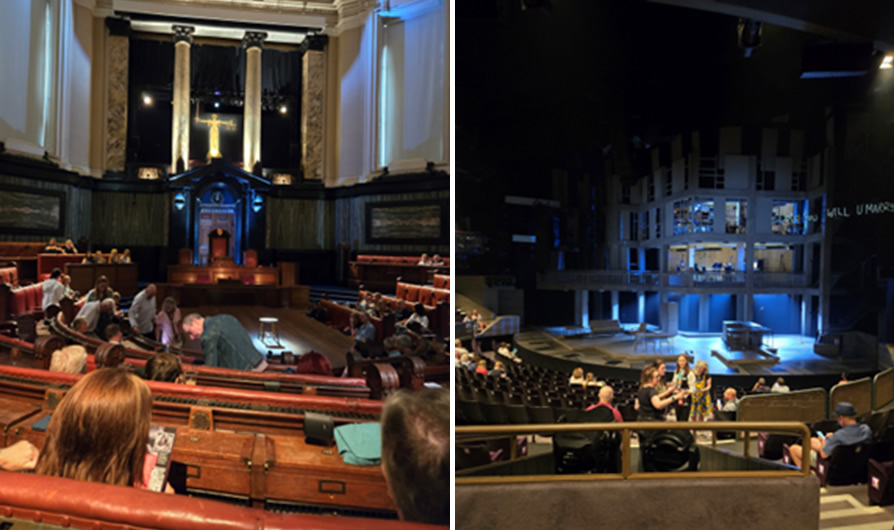
One of the most ballyhooed shows in London – and among the most expensive – is Standing at the Sky’s Edge at the modern Gillian Lynne Theatre. It is a musical set in what was originally a public housing project which eventually became high-octane condominiums. It is a huge production, with twenty-three actors, a high-flying stage and lush orchestrations, but in the end (in my view) there’s no there there. The story is built around the songbook of a British musician, which means that it is cobbled together to reflect some rocker’s abstract sentiments over the course of his career.
I continued to feel cruddy, but not so bad that my ability to eat or render opinions was impaired. It is a canard to say that British food is not tasty. I ate at Italian, Morrocan, Indian and Chinese restaurants throughout London, and they were all good. But everything is pricey, and in surprising ways. At the beginning of one meal, the waiter asked us if we would like some water. We said yes, and when the bill came there were two £5 charges for water.
All good things come to an end, so eventually we flew back to New York – to drive to another event, a Thanksgiving-in-June in Buffalo (If you’ve ever had Thanksgiving in November in Buffalo, you’ll understand why this one is in June). At the conclusion of the party, a family member casually asked me if the ship had tested us for Covid before we got off. Of course, it had not. She had a test handy – and sure enough, what I thought had been the Cruds was actually the Covid. So we hopped in the car and drove home.
But it made me think. What if the cruise had tested me, and I came up positive? My trip would have been ruined. I couldn’t have eaten out, and if I saw the shows at all I would have been heavily masked and miserable. So should I make it my business to test myself for Covid every time I feel ill? Even if it could mess up my plans? I’m curious – what do you do?
